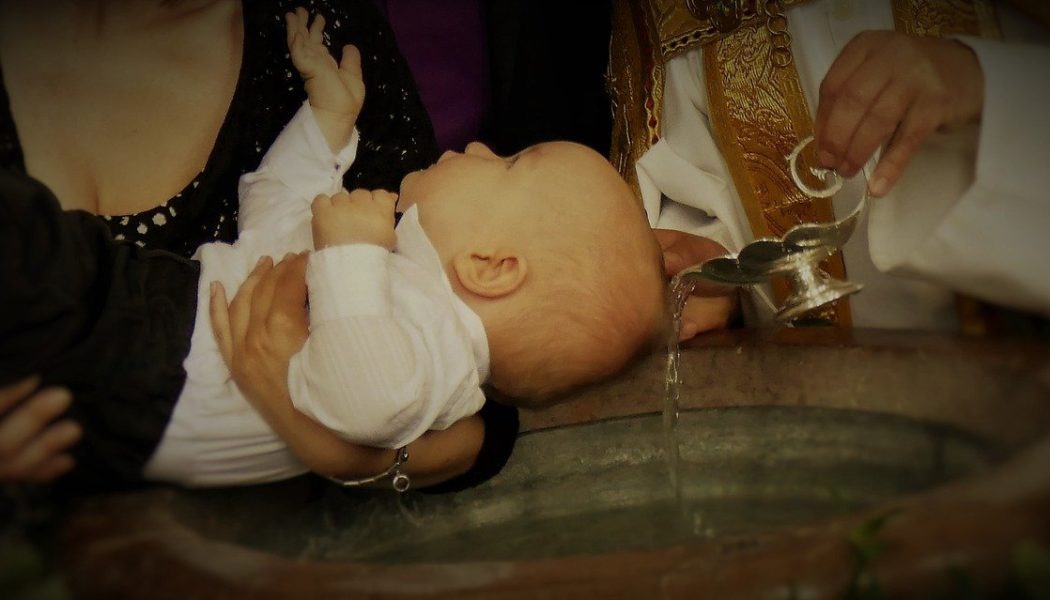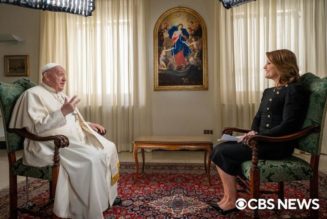
What is the role of journalism? Above all, it is to inform and educate. We know that reliable information is needed for any society to properly work. At the very least, readers deserve accurate information.
What happens when this isn’t the case? That’s the dilemma that befell many news organizations in recent days when a big Catholic news story came across their newsroom desks.
Yes, I’m referring to the botched baptism story out of Arizona last week that made so many headlines. And that’s hard to do considering the ongoing pandemic, the Beijing Olympics and Russia-Ukraine crisis.
Yes, baptism-gate has been all the rage. News coverage of it, however, not so good. More on that later.
To summarize: a priest named Andres Arango, following a church investigation, determined that he’d incorrectly performed thousands of baptisms over more than 20 years. It meant that those who had been baptized in Phoenix, and at his previous parishes in Brazil and San Diego, needed to be baptized again.
What did he do wrong? Arango, who has since resigned after making the mistake, used the wrong pronoun. Instead of saying, “I baptize you in the name of” he used “we.” After diocesan officials found out, they said people who Arango baptized aren’t officially Catholic. That means they weren’t eligible for other sacraments like Holy Communion.
<div class="sqs-block embed-block sqs-block-embed" data-block-json="{"hSize":null,"floatDir":null,"url":"https://twitter.com/AP/status/1494060995592994816","html":"
The Catholic Church said baptisms performed by a priest who served in Arizona for 16 years are now presumed to be invalid because he used incorrect wording on a subtle but key component of the sacrament.
It\u2019s unknown how many baptisms were affected. https://t.co/I6TnplTi7T pic.twitter.com/OvabyPl4KO
— The Associated Press (@AP) February 16, 2022
\n","width":550,"height":null,"resolvedBy":"twitter","providerName":"Twitter"}” data-block-type=”22″ id=”block-yui_3_17_2_1_1645462555532_21171″>
The Catholic Church said baptisms performed by a priest who served in Arizona for 16 years are now presumed to be invalid because he used incorrect wording on a subtle but key component of the sacrament.
It’s unknown how many baptisms were affected. https://t.co/I6TnplTi7T pic.twitter.com/OvabyPl4KO
— The Associated Press (@AP) February 16, 2022
This is where the news coverage got interesting. Once again, on an issue of great importance to Catholic readers and church leaders, secular news outlets assumed the views of one side were normative — even accurate — at the expense of church doctrine. Here at GetReligion, we have a name for that approach (click here for information).
Everyone from The New York Times and USA Today to NPR and local news outlets covered the story. What we learned from the coverage was telling. It was also largely one-sided and inaccurate. They appeared to drive an agenda rather than inform and educate.
In order to explain news events, journalists rely on experts. Those are the people that can explain and give context to what has or is happening. In the case of this baptism story, the experts used were the wrong ones or, at the very least, were the experts favored by one side of the debate.
I have written at GetReligion in the past about the need for journalists to have canon lawyers in their smartphone contact lists to call on for such instances — especially when sacraments like confession and Holy Communion become mainstream news fodder.
Here’s a prime example. The Washington Post, in a piece they published on Feb. 16 where they did a question-and-answer with Father Thomas Reese, a priest whom they describe as “a political scientist and longtime journalist who has written several books about the inner workings of the Catholic church.” For decades he has been a “round up the usual suspects” source for the mainstream press.
Reese wrote about the baptism wording issue in 2020 in a Religion News Service piece under the headline: “Vatican causes chaos by invalidating baptismal formula.”
What did Reese conclude at that time? Here’s what he told The Washington Post when asked why pronouns matter:
The hierarchy wants priests to follow the words in sacramental ceremonies very strictly. On the other hand there is structure in [the sacrament] for some adaptations. And also there is disagreement. We know historically there were times in the Church when priests made up prayers. In different communities they had different lingos. In the early centuries of the Church, they didn’t have books. It wasn’t until the printing press that you could force people to use the exact same language.
And there’s some evidence that in ancient times, people would baptize “in the name of Jesus” [instead of in the name of the holy trinity of “the father, the son and the holy spirit,” as is said today]. Orthodox churches use a passive voice: “This person is baptized …” and the Catholic Church has recognized those baptisms for centuries.
The bottom line is, historically the words of baptism have changed. To make suddenly a big deal of whether a priest uses “I” or “we” is mind-boggling.
Reese is certainly entitled to his opinion, but it doesn’t make him an authority on the subject or even correct on the matter. Once again, Reese has become one of those priests that many journalists like to rely on as a quick-call Catholic expert. In this case, however, he is not. Reese isn’t a theologian nor a canon lawyer, making his view not one worth spending an entire Q&A on.
<div class="sqs-block embed-block sqs-block-embed" data-block-json="{"hSize":null,"floatDir":null,"url":"https://twitter.com/jdflynn/status/1491575097643225095","html":"
The CDF\u2019s clarification represents a complicated doctrinal judgment that touches on people\u2019s real, every day lives of faith.
So what's the catechetical plan here?https://t.co/RX8aEOb8Vj
— JD Flynn (@jdflynn) February 10, 2022
\n","width":550,"height":null,"resolvedBy":"twitter","providerName":"Twitter"}” data-block-type=”22″ id=”block-yui_3_17_2_1_1645462555532_139470″>
The CDF’s clarification represents a complicated doctrinal judgment that touches on people’s real, every day lives of faith.
So what’s the catechetical plan here?https://t.co/RX8aEOb8Vj
— JD Flynn (@jdflynn) February 10, 2022
Catholic media, not surprisingly, did a better job on this old story. The Pillar followed up on the ongoing issue on Feb. 18 with this observation regarding the news media’s coverage:
This week saw the story break through to the secular media, only two years behind the curve, with major outlets ranging from the Washington Post to the New York Times to CNN rushing to wheel out comment pieces and Q & As with anyone willing to sneer at the Vatican’s 2020 declaration that baptisms attempted using the first person plural pronoun are invalid.
I found this thought provoking, on a few levels.
There is, of course, the irony. Outlets like the Times and the Post have run myriad pieces in recent years about the use of “preferred pronouns,” including referring to someone in the singular vs plural, and how failure to get it right is an abuse of power and a tool of oppression.
Speech like that, I have read more than once in zer pages, is a kind of violence; words have real effects, and ze are usually the first to insist on it.
It requires a particular kind of doublethink to hold that the Church is being absurdist and quibbling in saying there is a material difference between saying “I” and saying “we,” while holding that saying “she” instead of “they” is akin to assault.
It would be funny, if the setup to the joke wasn’t the descent of our public discourse into self-referential existential madness.
They also took a shot at Reese and other so-called experts (without naming any of them) who went out of their way to dismiss the Vatican’s position on the sacraments. Here’s more from the article at The Pillar:
The reason for the confusion is, perhaps, more easily understood when we see quite so many media priests primed, at a moment’s notice, to mock the idea that sacraments are genuine binding realities, and dismiss a Jesuit pope and prefect as quibbling, pettifogging legalists.
Many local news sites — after all this started as a local story in Phoenix, with coverage such as this story from NBC affiliate News 12 — did a solid job reporting the Vatican’s theological reasoning for why priests should use “I” and not “we.” As noted, there are long-term theological implications for those Catholics not really baptized. After all, it is necessary for salvation, according to the church.
Unfortunately, this concept was not given much space. A column in the Anchorage Daily News by Lawrence Downes — described only as a “writer and editor in New York” — deduced the following:
Some Catholic hard-liners are taking the wrong lesson from this calamity — that parishioners need to monitor priests from the pews for inclusive language. They think this is only about the incantation and about owning the libs. These are the textual hard-liners who are flexible when it suits them. They hear Jesus say, blessed are the peacemakers, and think he is endorsing firearms. As for welcoming strangers at the border and not killing prisoners with lethal injections — both explicit instructions from multiple popes, citing Jesus’ authority — they hear those commands not at all.
Downes, a member of the New York Times editorial board since 2004, does what many do with religion stories — frame the debate in political terms, since politics is real and religion is not so real. He quotes Reese in his piece, of course. Downes also describes himself as a lapsed Catholic, again not exactly an expert.
The specifics of the doctrines surrounding sacraments, be it baptism or Communion, are just too difficult for many journalists to write about fairly. When they do choose to tackle these issues — in news stories or columns — they tend to assume the Vatican is wrong and rigid.
After all, the experts they consult over and over again agree with that very notion.
FIRST IMAGE: Baptism photo via Pixabay.








